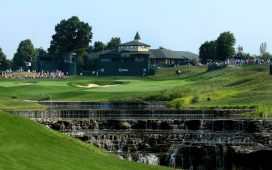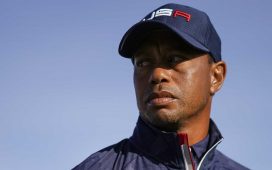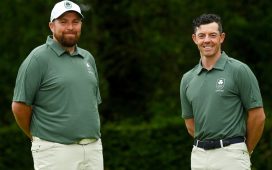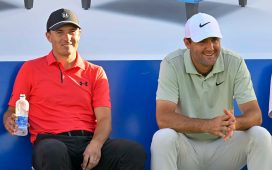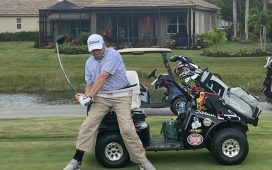AUGUSTA, Ga. — If you ever find yourself with the good fortune of attending the Masters, do yourself a favor and attend the opening tee shots.
Wake up early on Thursday, wipe the sleep from your eyes and crawl into your car. Drive up to the golf course. As the sun begins to poke through the sprawling oak tree behind the clubhouse, fast-walk your way to the first tee. Wait.
Soon enough, three players will take the tee — several green jackets and endless history among them. Woosh, crack. One by one their balls will take flight. None will travel more than 200 yards. The players won’t finish the round, or even finish the hole. No matter. It’s still a rush being there, watching a tiny piece of Masters history unfold before you.
In Masters moments like this, you’ll find yourself absorbing every detail and perhaps even rehearsing in your head how you’ll recount the memory to, well, let’s call them the invisible patrons: the fathers, mothers, brothers, sisters, grandfathers, neighbors and old friends who you wish could share this experience with you.
Every attendee is accompanied by at least one I.P., but most have several. They introduced us to the sport. They’re regulars on our buddies’ trips. They live up the road from us, play in our weekly poker games and perk up even at the mention of “Augusta National.” They’re all here at Augusta National, even though they’re not.
Scott Van Pelt, the ESPN broadcaster, brought two I.P.’s to his first Masters, in 1997.
“My grandpa and my dad — they were huge sports fans that were so impactful to my life who were no longer in life,” he said this week. “I just thought, Man, they’d have smiled big if they saw their boy walking around Augusta working.”

Stephen Denton
The elder Van Pelts were understandably hooked after Tiger Woods’ blowout win that year. Now, in spirit, they make the trek to Augusta each spring.
“That first time, it just blows your mind what it looks like, because nothing anyone tells you will prepare you for what it is,” Van Pelt said. “Then you see it, and you go, ‘Oh, well, now I kind of get it.’”
Tyler Strafaci, a young amateur, made his first Masters start this week. At his side, even though the two never met, was his late grandpa Frank, who played in a pair of Masters in the 1930s.
“It’s pretty cool, the whole Strafaci family is an American dream,” Tyler said. “Just where my grandfather and my grandmother and even my parents on my mother’s side, none of them were born in the U.S. So it was cool just to kind of be here and to see where we all came from.”
An average badge-holder might smuggle in a half-dozen I.P.’s. Their gaggle might roam Amen Corner or post up behind the 18th green. They’ll holler after birdies, gaze in awe, graze on pimento cheese sandwiches and sip on $4 pints.
Some invisible patrons are repeat visitors, like legendary CBS Sports broadcaster Jim McManus. You probably know Jim by his stage name, Jim McKay, under which he called several Masters for CBS in the late-50s and early-60s.
“When I set foot on Augusta National that first time as the head of CBS Sports in 1997, all I could think about was my father,” said Jim’s son, Sean, now the CBS Sports chairman. “He loved the Masters, he loved Augusta National. For me, it was life going full circle.”
“The thrill of victory and agony of defeat” must mean something to the McManus family, because Jim hasn’t missed a Masters in years. He is his son’s invisible patron, trading ABC’s Wide World of Sports for buttoned-up bliss.
“I think of him every day that I step foot on Augusta National,” Sean said. “I think about my father, and the shows that he did, all the Masters coverage that we watched together. Whatever legacy I have — which is small compared to my father’s — I’m just, in some way, hopefully carrying on the legacy he set so successfully.”
The Masters is all about legacy and familiarity, powered by the fact that even casual golf fans know every inch of the place, or at least every hole. We watch it with friends, with loved ones, with those we’ve known forever and those we barely know. The secret to the tournament’s success is that, to most of us, each year’s winner matters little next to those with whom we watch Masters Sunday.
“My mom and dad,” said CBS Sports stalwart Jim Nantz, when asked about his I.P.’s. “They were the ones who nurtured this crazy idea that one day maybe I can work for CBS, call the NFL and broadcast the Masters Tournament. They are both with me at Augusta. It’s been a lot of years now, but I wouldn’t be there without their love and support.”
Heather Duncan, given the limited attendees in 2021, was one of the few patrons attending their first Masters this week. She made the 15-hour drive from Charlestown, Mass., to Augusta for three practice rounds. She said her late father was with her in spirit.
“Seeing Phil Mickelson and Sergio, I watched those guys with my dad, so that was kind of cool,” Duncan said. “I was thinking of him, especially because he could never be here.”
As Heather reached the turn on Monday, she said she felt her father’s presence.
“They say when you see a butterfly, that’s a loved one,” she said. “We were on 10 and a butterfly flew by. All I said was, ‘That’s him.’”

Stephen Denton
You hear those kinds of stories a lot around this course.
“I thought about my teacher George Palmer the whole time down there because he had passed the year before,” CBS analyst Dottie Pepper said of her 1987 Masters visit. “So much of what he had me read, what he had me understand about the game was centered on Bobby Jones. So when I did get there, I just kept thinking, wow, he was right about all of this — about all that this place stands for.”
What does the Masters stand for?
Co-founders Bobby Jones and Clifford Roberts said the event was designed to showcase “one uncomplicated place” where members “can feel completely at ease.” Others would tell you it’s the grandest stage in golf.
But you? You know the truth. The more important question isn’t what the Masters stands for, but who.





